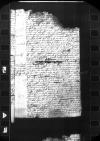⌊Nuntio meo⌋ XIII-a huius ... ⌊dominorum consiliarior[um]⌋ respondent in a ....
[Inte]rim vero misit ad me ⌊reverendissimus dominus⌋[2] ... in quibusdam nostris negotiis ... ⌊[serenissimae] maiestatis regiae⌋ ad me pervenisse ... ⌊[dominis] consiliariis⌋ ante nostra ⌊comitia⌋ impr... licuit, cum igitur eas litteras regias ...perissem ⌊magistratui Gdanensi⌋ ratione contributionis ... scriptum esse, misi easdem litteras, ...s, quas nuper ... meus appet[e]rat cum resign[ation]e ⌊r[everendissimo domino] [Cu]lmensi⌋, ut ⌊Gdanum⌋ perferri curaret. Opus itaque no[n] erit aliis litteris, quarum misi exemplum, nisi et de prioribus in illis fieret mentio, quo sic tanto vehementius contributio urgeatur. Ad quam si iterum ipsi ⌊mei gentiles⌋ non accesserint, et, quemadmodum iam non semel reluctati fuerint, nihil cum aliis statibus et ordinibus hic efficiemus, quae ab illis dependent, ea in re facturi non aliud, quam quod viderint illos facientes. Inconsentaneum ob id non esset, ut denuo admonerentur, etiamsi litterae regiae serius vel in ipso ⌊nostro conventu⌋ nuntiis eorum redderentur.
Pudet me, Reverendissime mi Domine, quod quidem et Dominationi Vestrae Reverendissimae usu venire existimo,
me toties adeo demisse, nedum diligenter, ⌊magistratum Gdanensem⌋ pro ⌊Ioanne Holsten⌋ nequicquam ⌊⌋, eo illum quidam longe gravius quam prius implacabili odio persequuntur afflictumque adigere volunt, ut honoris et existimationis quae coram omni populo apertis in sessio[nibus] ... [s]alutem iacturam ...tio, per quam pub[lica]m revocationem faciat, qui mallet citius et bonis, et vita cedere, antequam in perpetuam illiusmodi ignominiam incidat, [qua]m boni viri in ma[gist]ratu, quibus rigor [vald]e displicet, et
[in] scripto mihi [de]clararunt. Quam auctoritatem et pondus Dominationis Vestrae Reverendissimae perinde atque meae pro ⌊illo⌋ commendationes habuerint, satis est luculentum.
Isti, qui hoc negotium adeo exasperarunt (suntque de nostris, qui plurimum nobis intimi videri volunt), nullius nostrum se opera aliquando indigere putant. Indigni vicissim, quibus a Dominatione Vestra Reverendissima quacumque etiam in re in posterum gratificetur, me certe multum a se abalienarunt, cum in hac causa, tum quia toti madent Luteranismo, Quadragesima
enim transacta usu carnium cum multorum offendiculo publice sunt abusi. Praeterea, cum nuper electio ⌊magistratus⌋ fieri deberet et ob id ad ecclesiam ex more convenissent sacerdosque ad solitam
canendam missam de Spiritu Sancto altari se applicasset, iussus fuit re divina infecta sacrum relinquere. Nihilo secius omnia apud illos aguntur, quam apud ⌊vicinum⌋ meum, ad cuius exemplum pro consuetudine, quae illis cum eo est coniunctissima, se totos componunt. Si ⌊serenissima maiestas regia⌋ diutius connivebit, ne quid gravius, immo periculosius quam prius umquam consequatur, maxime est verendum. Non abs re foret, si serio in iis,
tum
ob processionem Corporis Christi Sanctissimi intermissam[3] ad ⌊conventum⌋ futurum a serenissima ⌊maiestate regia⌋ scriberetur.
Haec, quemadmodum alia omnia, in aurem scripseram manu mea, sed vix ipse hoc caliginoso tempore meas notas agnovi. ⌊Vulcano⌋ dentur, oro.
Meque Dominationi Vestrae Reverendissimae intime et studiosissime commendo.
